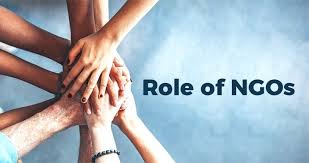
NonProfit Organisations (NPOs) are very important and essential groups a country must have in each society and community to ensure her development. Apart from them profiting nothing from the Government of the day, they help in building the country, elevating the country, maintaining sanity in the country and bringing the government of the day to order when they go wrong.
They play a crucial role in humanitarian action, the sustenance of democracy and good
governance, the protection of human rights, and poverty reduction.
ACTIVITIES OF NONPROFIT ORGANIZATIONS IN DEVELOPING NIGERIA
According to Lewis, 2007, Nonprofit Organizations activities are analyzed as having three main components: implementer, catalyst, and
partner. The implementer's role involves sourcing resources to
deliver goods and services to people who need them. NPOs deliver services across
various fields, such as healthcare, agricultural extension, emergency
relief, and human rights. This role has become more prominent as NPOs increasingly
respond to artificial emergencies or natural disasters with humanitarian assistance.
The catalyst can be defined as an NPO's ability to inspire, facilitate, or contribute to
improved thinking and action to promote social transformation.
The role of partners reflects the growing trend for NPOs to work with
government, donors, and the private sector on joint activities, such as providing
specific inputs within a broader multi agency program or project or undertaking
socially responsible business initiatives. It also includes activities among NPOs themselves and
with communities, such as 'capacity building' work, which seeks to develop and
strengthen capacities.
Furthermore, studies have shown that the developmental
activities of most NPOs in Nigeria usually focus on nature conservation, skill
acquisition, economic empowerment, disease control, and management, literacy
schemes, capacity building, amenities provision, conflict resolution, charity, and
peace promotion, which are all critical for development (Eni, 2005).
Another study by Adebayo (1997) revealed that most NPOs in Nigeria focus
on development-related issues, which indicates a positive drive to stamp out the
poverty plaguing Nigerians at different levels. Again, NPOs have been increasing
their involvement in rural development activities in Nigeria. However, in more recent
times, it has been observed that certain factors have been limiting their performance in contributing to rural development. In this regard, Faride & Adisa (2005) reported that
the constraints facing Nonprofit Organizations in Nigeria range from poor collaboration with
government agencies, political instability, and strong affiliation to over dependence on
donor partners and corrupt practices in some cases.
Most times, Donors will prefer to work only with NPOs having legal status that can produce project
proposals, plan correctly, and produce reports regularly.
According to the Nigeria Network of NGOs (NNNGO) cited in FGN (2010), all Nonprofit Organizations are Non governmental organizations divided into eight areas or spheres where they have
enormously contributed their quota to Nigeria's development.
These areas include
youth development; NGOs in this sphere have dealt with issues concerning or relating
to young people. On democracy and good governance, NGOs in this area or sphere of
interest cover legal issues around democracy in Nigeria. An example is what Metalex is doing for the youths and interns of the legal profession providing trainings and enlightenment on
public finance, law, governance for Democratization, International Press Center, and Media for
Democracy, that has helped and continue to help Nigeria's nascent democracy
improve.
Another area is the environment. NGOs in this area focus on environmental
policies, climate change, and natural resources, to mention a few. Among them are the
Earth Right Environmental Network Initiative and the Environmental and Tourism
Support Initiative, whose activities have helped address several environmental
challenges, like cleaning the Ogoni Kingdom in Niger Delta.
Another area where NGOs' impacts have been felt in Nigeria is the Health
sector, which provides most rural Nigerians with accessible health care. This also
includes providing medical and moral support to people living with HIV/Aids and
sensitizing others on how to avoid contracting the virus. The fight against several
deadly health conditions was only won in some cases with the efforts of most NGOs
in this sphere of influence. Some NGOs cover the spheres of research and policy.
Their activities revolve around research on policies and economic development that
has helped improve Nigeria's financial and political situation.
Finally, from a broader scale, Cernea (1988) stressed that NGOs embodied a
philosophy that recognizes the centrality of people in development policies, but so
much was expected of them, which came to be seen in some quarters as a “quick fix”
for development challenges. This, therefore, led to a backlash against NPOs by the
end of the 1990s, when the evidence began to suggest that they had only partially
lived up to these unrealistically high and tall expectations globally (Lewis, 2007).
Despite the backlash, in 2004, it was estimated that NGOs were responsible for about
$US 23 billion of total aid money, or approximately one-third of total Official
Development Assistant (ODA), suggesting that Official Development Assistance
provided through NGOs had increased from 4.6% in 1995 to 13% in 2004, and that
the total aid volume increased from US$ 59 billion to US$ 78.6 billion in the same
period (Riddell, 2007).
CONCLUSION
Nonprofit Organizations have continued to positively affect lives in their various spheres and domains of influence. Development cutting across youth development, democracy and good governance, poverty
reduction, health, and women empowerment, among others have been discussed above. However, lack of
effective collaboration with government agencies at all tiers, lack of proper
accountability resulting in corrupt and sharp practices in most cases, and inadequate
knowledge of the critical development challenges confronting most of the
beneficiaries, among others, are seriously militating against their roles and activities of Nonprofit Organizations.
Hence, their contribution to development based on these challenges, it is suggested that first, there is a need for
effective and efficient collaboration between Nonprofit Organizations and government agencies at all
levels in the country's development quest. Secondly, Nonprofit Organizations should ensure
transparency and proper accountability in discharging their duties, especially on
donor-funded project execution. This will encourage more project funding, increasing
their contribution to Nigeria's development. Finally, Nonprofit Organizations should embark on projects
that will address the critical development needs of their beneficiaries. Achieving this
involves establishing a solid connection with the beneficiaries before project design
and development to identify the areas of development need among the People.
© OLALEKAN AYOBAMI OLABISI
REFERENCE; THE ROLE OF NONGOVERNMENTAL ORGANIZATIONS IN THE DEVELOPMENT OF NIGERIA (Eze, Robert Martins)


